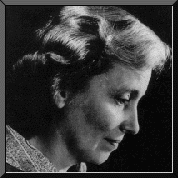 Dorothy
Crowfoot Hodgkin,
a British biochemist and crystallographer, won the 1964
Nobel Prize in Chemistry for "her determination by x-ray techniques
of the structures of biologically important molecules." In other
words she used x-rays to find the structural layouts of atoms and the
overall molecular shape of over 100 molecules including: penicillin,
vitamin B-12, vitamin D, and insulin. Hodgkin's improvements using
x-ray crystallography elevated the technique to an important
analytical tool. (Crystallography is a combination of physics, math,
and chemistry.)
Dorothy
Crowfoot Hodgkin,
a British biochemist and crystallographer, won the 1964
Nobel Prize in Chemistry for "her determination by x-ray techniques
of the structures of biologically important molecules." In other
words she used x-rays to find the structural layouts of atoms and the
overall molecular shape of over 100 molecules including: penicillin,
vitamin B-12, vitamin D, and insulin. Hodgkin's improvements using
x-ray crystallography elevated the technique to an important
analytical tool. (Crystallography is a combination of physics, math,
and chemistry.)
Dorothy was born on May 10, 1910 in Cairo, Egypt. She obtained degrees from Oxford and Cambridge Universities. By 1934, Hodgkin correctly analyzed the molecules for cholesterol iodide. Several years later she confirmed the structure of vitamin B-12, with the help of one of the first electronic computers. Understanding the molecular structure of vitamin B-12 has helped scientists to understand how the human body uses B-12 to build red blood cells and prevent some types of anemia.
Dorothy's discovery of the molecular layout of penicillin helped lead scientists to develop other antibiotics. As her discovery happened during World War II, this information aided scientists in helping to develop the antibiotics necessary to treat war injuries.
In 1969 after more than 30 years studying molecules, Dorothy unlocked the key to the discovery of the three dimensional structure of insulin. This breakthrough helped scientists contol the disease, diabetes.
Dorothy received many awards and honors throughout her lifetime. At age 37 she was inducted into the Royal Society in England. In 1965 she received the Order of Merit, the highest civilian honor in Britain, and only the second woman after Florence Nightingale to receive this award. Not only did Dorothy work with scientists from all over the world, one of her most famous students was the former British Prime Minister, Margaret Thatcher.
Although Dorothy's work changed the face of modern biology, she also had many other interests. Her family was always important. Dorothy encouraged many science students from all over the world. She helped to establish and support the Hodgkin Science Scholarship intended for a student from a third world country. Dorothy was also known in international circles as a tireless champion of disarmament and world peace. She never let her lifelong struggle with rheumatoid arthritis, which eventually crippled her hands and feet, interfere with her science career. Speaking for many former students and colleagues, M.F. Perutz sums up Dorothy with the following quote: "She will be remembered as a great chemist, a saintly gentle and tolerant lover of people, and a devoted protagonist of world peace."
Page created by: Christie Burkhardt
References
Porter, Roy (1994). The Biographical Dictionary of Scientists Oxford University Press, Ed. 2.
Adams, M.J., and Glusker, J.P., (1995)."Dorothy Crowfoot Hodgkin, 1910-1994" Physics Today, May 1995.
Vijayan, M. (1995). An obituary of Dorothy Crowfoot Hodgkin. 2nd May 1995 Crystallography World Wide Editor, International Union of Crystallography.
World Book Encyclopedia (1993). World Book, Inc. Volume H.
Groliers Electronic Encyclopedia (1995). Version 8.0 CD-ROM by Grolier, Inc.